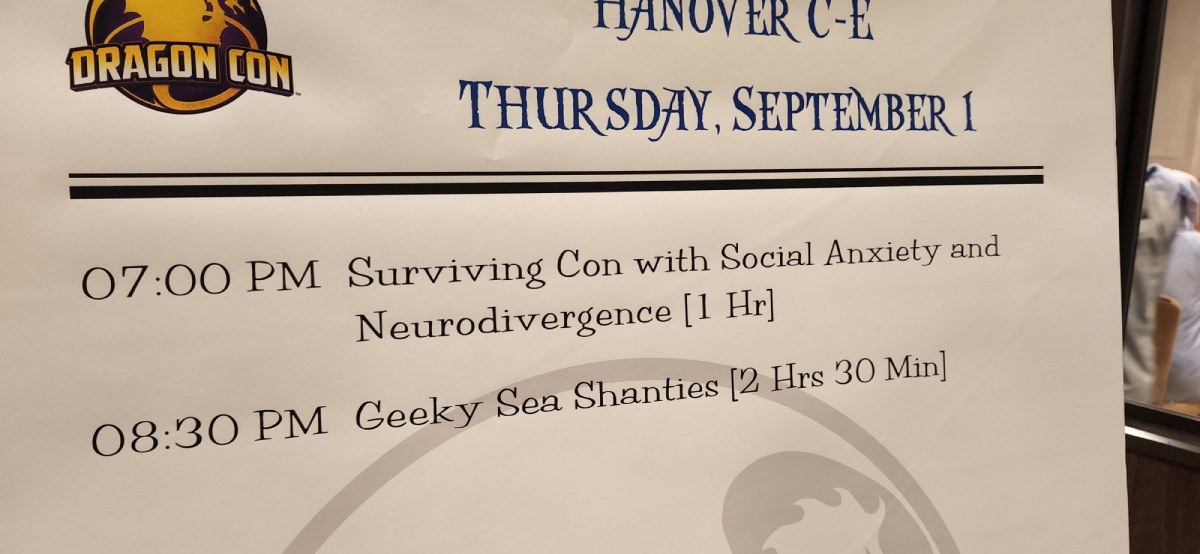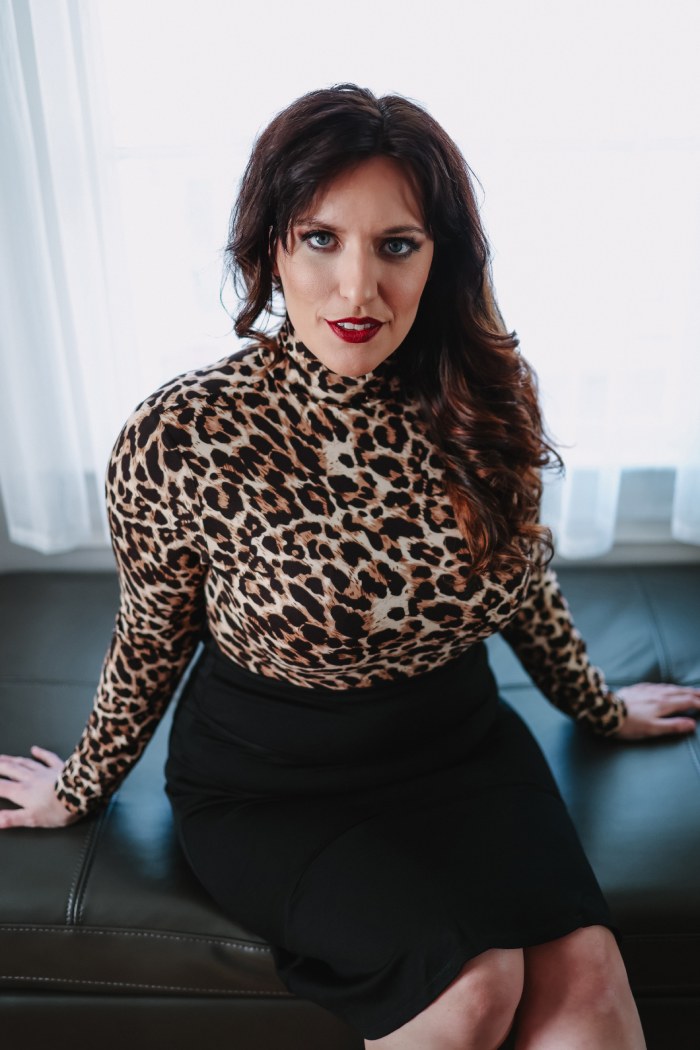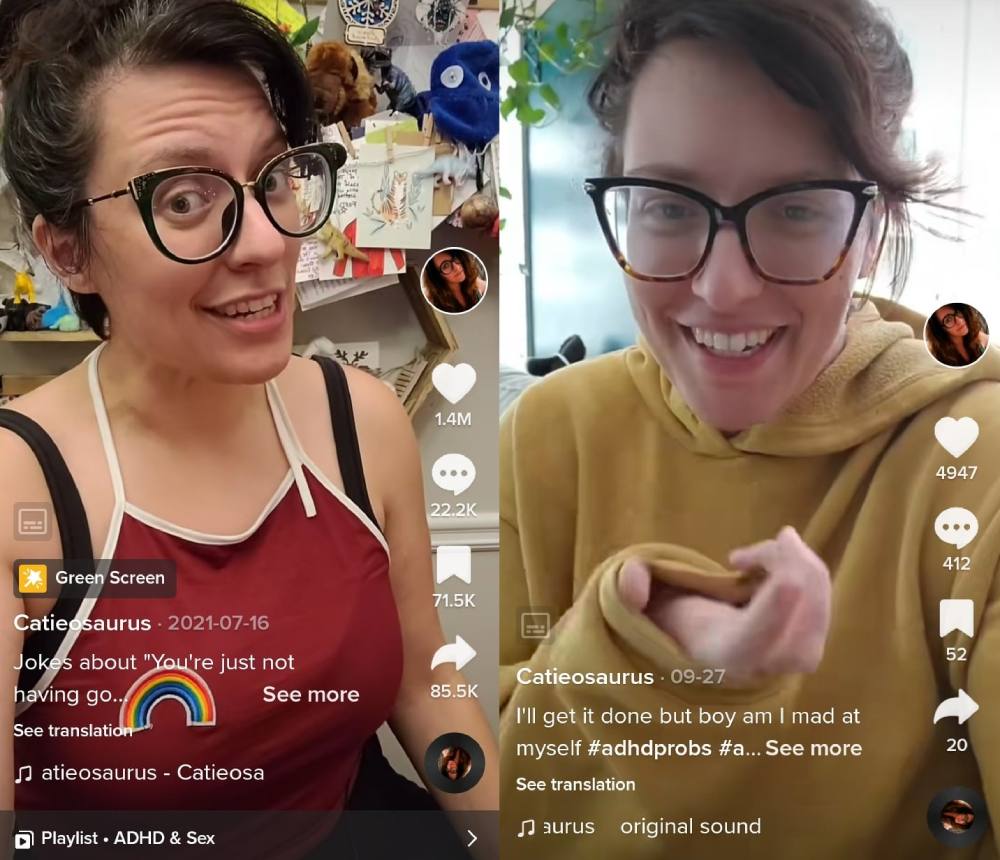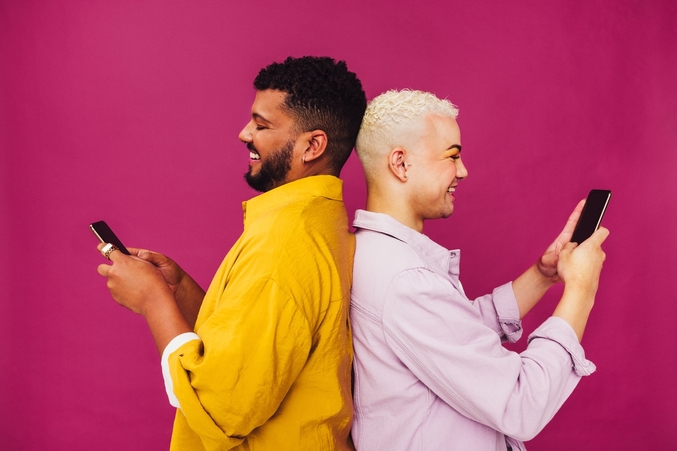Jump To
When it comes to people with ADHD or Autism, most of the focus in research and treatment is aimed at children and school work. While it is understandable to focus on these areas, a major hole exists for adults just living their lives. Especially when it comes to sex and relationships.
Catieosaurus, a content creator and sex educator, saw that hole and wanted to fill it.
ADHD in Adults – The “Burnt-Out Gifted Kids”
Neurodivergence is a relatively new term, and most people do not have a real grasp of what it is. To put it in the broadest of strokes, neurodivergence is a natural variation in the human brain that leads to differences in how we think and behave.
Yes, everyone’s brain works differently, but not to the same extent.
Neurodiversity covers a wide range of developmental disorders like Autism, Tourettes, Dyslexia, or ADHD. Most people have some understanding of what these disorders are but only see the tip of the iceberg.
Sticking to ADHD (Attention Deficit Hyperactive Disorder), there is a lot more to it than a child who can’t focus or forgetting where you left your keys. There is a cavalcade of difficulties someone with ADHD can struggle with throughout their life.
To start, the “deficit” part is kind of a misnomer. Brains with ADHD have a lower level of dopamine and serotonin, hormones that regulate things like motivation and attention. People with ADHD can pay attention, the issue is regulating that attention when needed. When dealing with a topic that seems boring, paying attention can be almost impossible.
If they’re interested in a subject or activity, they can have what is called hyperfocus. This is why people with ADHD can learn new skills or topics quickly. However, issues with working memory can make it hard to recall anything learned when it’s needed.
Other struggles can include regulating emotions, extreme sensitivity to rejection, time blindness, or executive functions like remembering to pay bills or even eat.
Many adults with ADHD call themselves “burnt-out gifted kids.” The students that teachers usually said were too smart for their own good or are wasting their potential.
It’s not about being smart as much as conforming to neurotypical standards.
Some ADHD kids do great in school. Others grew up being called lazy or stupid. These damaging messages can cause comorbidities such as depression or anxiety.
It’s a lot to handle.
These challenges can negatively affect relationships, both romantic and platonic. Having a partner who struggles to do basic adult things like clean or remember scheduled events can get frustrating.
While relationships and sex are major aspects of life, study and treatment for ADHD tend to ignore these aspects in favor of making sure you’re a good little worker. There are few resources for living with ADHD outside of the office or classroom.
Thankfully, there’s someone taking that challenge head-on.
Tyrannosaurus-Sex – Introducing Catieosaurus

Catieosaurus (she/them) is a multihyphenate of multihyphenates. A certified sex educator, performer, podcaster, TikTok star, OnlyFans creator, and mental health advocate.
Oh, and a huge nerd.
Preferring the term “Content Creator” to “Influencer”, Catieosaurus is best known for her funny and informative content focusing on neurodivergence and relationships. She also co-hosts the Infinite Quest podcast that mixes table-top role-playing games with sex and mental health.
Full disclosure: I was diagnosed with ADHD at 33 years old and found Catieosaurus’ account while looking for more information about how my brain worked. There were plenty of accounts about getting through day-to-day life, but few talked about sex and relationships. So, I was already a fan.
I am also a huge nerd, so we met up at Atlanta’s Dragon Con where she would be on several panels, with one discussing how to handle the deluge of stimuli that massive cons bring.

We sat down at a hotel bar, trying to focus on the interview and not the various superheroes and monsters grabbing drinks nearby.
Shakespeare, Hormones & Leaning Into Spite
JP: So, what is your origin story? What brought you specifically into the world of sex and neurodivergence?
C: Spite, honestly.
JP: Great answer.
C: Basically, I was diagnosed with ADHD the day before my 30th birthday, which was very strange. Because I grew up my whole life believing I was broken and weird and wrong and everybody else had the memo and I didn’t. It’s a really, really long story, so I’ll shorten it.
I was working at a Shakespeare company, and I had had an ovarian torsion. So, I needed to have my left ovary removed, and it kicked off a hormonal imbalance in my body, and that kicked off my ADHD much more profoundly than I had been used to living with.
I thought I had early-onset dementia. I couldn’t remember my lines, I couldn’t focus, I couldn’t sit down. I was like, my personal and professional life is on the line, I don’t know what to do.
Thankfully, I had a friend who has ADHD. He was like “I don’t think you have dementia, I think you have ADHD. You need to go get evaluated.”
I said “How could I not know I have ADHD?” and he goes “I’m not here to diagnose you, but you have ADHD.”
So, I went, and I got super lucky. Not a lot of people have this experience their first time out, but my doctor also has ADHD, and also has anxiety and was like a burnt-out gifted kid her whole life. So, she was like “I see you, I understand what it’s like to be in your shoes.”
I’m explaining this whole story to her and went “yeah, well that makes sense. ADHD can really play with your hormones.” and I was like, “What?!” That was the first time I’d ever heard about it.
JP: I actually have never heard about that. I read somewhere that ADHD is at its strongest when you’re in your late 20s to early 30s. I found that to be true, but I guess I never put two and two together.
C: Yeah, it’s different in AFAB (assigned female at birth) people because basically what happens is that when the levels of estrogen in your body lower, your dopamine and serotonin lower. Dopamine and serotonin are the things responsible for your moods, emotional regulation, and attention. So, for people who get their period, the week before they get their period is a nightmare.
We also see this happen a lot for people going through menopause. Their ADHD gets so much worse, and they’re like “What is going on?” The reverse happens for pregnant people. They have more estrogen because they’re pregnant, so their ADHD gets better.
And no one talks about it.
So, to get back to “spite,” I just got mad. I started learning more about ADHD, just researching and researching stuff that was important to me. For me, I don’t experience ADHD as this “school” thing. You know? You’re a little kid running around in the back of the classroom, not turning in your homework on time, but I was always super-successful at school.
I wasn’t organized, but I had a system. When I later became a professional stage manager, it was just all systems all the time, and I could thrive in that environment. But, the more I learned about ADHD, I realized there was one component nobody was talking about. That was the effects of ADHD on relationships.
It’s profound. Again, it’s like the idea of ADHD is just a school thing or an office thing, or a chores thing. No. ADHD is insidious, and it impacts every moment that we’re navigating through the world, including trying to relate to people we love, or have sex, or get in the mood.
When I started looking at some of the studies about sex and sexuality and ADHD I was like “why the f*ck isn’t any of this in the brochure?”
There’s a lot of people talking about ADHD. There’s not a lot of people talking about kink and ADHD. So, let’s talk about that and safety through that lens. It turns out I’m super passionate about it.
That’s it, that’s my origin story. The end.
Attentive Partners(?) – Sex, Relationships & Neurodivergence
We discussed the weird things someone scrolling through ADHD TikTok people learn about themselves. Odd, specific behaviors and problems like auditory processing issues that make others sound like The Swedish Chef mid-sentence, or swishy walking around counters instead of avoiding them completely.
A major shared struggle is RSD, or Rejection Sensitivity Dysphoria. This is an emotional oversensitivity to rejection or even the very idea of it.
RSD is extremely common in neurodivergent circles, especially among folks with ADHD. Catieosaurus saw this as an opportunity to talk about the serious issues around consent.
C: [I was starting to] unpack the damage that Rejection Sensitivity had done in my own life in having that RSD reaction to things. That was a really huge help to me because not only did it allow me to speak about things much more vulnerably about a lot of issues relating to sex and intimacy, but gave me an opportunity to reach out to people who were feeling the same thing.
I hear from a lot of people about [my] videos about consent and Rejection Sensitivity and kink safety and Rejection Sensitivity. Some of my most popular videos are on those topics.
I think realizing the damage Rejection Sensitivity can do, like, helped shape my life.
Finding out a large portion of the angst and anxiety felt throughout your own life can be traced to RSD is a Shyamalan-level twist. It turns out it was trauma all along.
Another common feature of ADHD is engaging in risky behavior. Risk-taking can come from our need for novel experiences or pleasing people to avoid rejection. As Catie said, the motivations depend on the person.
There are studies that show both explanations are valid, but the waters get muddy when bringing in another trait that affects about 20% of people with ADHD: Hypersexuality.
JP: Pretty much every person I know with ADHD is pretty horny all of the time. I just don’t know if that’s an ADHD thing or just who I hang out with.
C: It also tends to go in waves. We also see people who deal with hyposexuality, a lower sex drive. Sometimes they think “well, there must be something wrong with me, and if I go out and have a bunch of sex that’s going to fix me.” That’s not the case, either.
I think it’s a combination of things. We see in teenagers there are higher rates of STIs or more unwanted pregnancies. We see a lot more sexual assaults. A lot of that can be grounded in that risk-taking behavior.
Again: spite! No one is talking about this. They’re focused on teenagers getting their homework in on time while teens are getting raped because they can’t consent in the way they need to. Why aren’t we having these conversations?
I don’t care about your homework. Let’s protect children.
JP: Do you think risk-taking behavior and getting into unhealthy relationships go hand-in-hand?
C: I think that one is a little harder to answer because it depends on the person and the situation.
There was this really obnoxious trend going around on Tik Tok a while ago saying people with ADHD are attracted to narcissists. I’m like “that’s not f*cking true!”
Abusers are attracted to easily manipulated people, and sometimes those people are people who are neurodivergent but not all the time. It’s the abusers looking for easy prey. Let’s not blame the victim. It’s not an ADHD thing.
It comes back to the whole “no conversation about us without us” thing. So many books are written by psychologists who don’t have ADHD who are talking to parents of children with ADHD about “how to get your kid to stop f*cking around in school” and not how to build support structures and systems that will affect their whole life. Not having conversations about boundaries and consent, which people with ADHD might struggle with.
JP: What are some of the bigger issues neurodivergent people have when it comes to relationships and sex?
C: It really depends on the person. About 40% of people with ADHD struggle with some type of sexual dysfunction and/or sexual disappointment.
What I mean by that is not every issue sexually is a dysfunction, in that something is medically wrong. It could be the living situation or what’s going on in your life. In particular, people with ADHD struggle to get in the mood or stay in the mood.
Some struggle with hypersexuality and are always in the mood, and it’s like a hyper fixation thing. Some struggle with orgasm, and all genders struggle to arrive at orgasm and finish.
One we don’t talk about a lot and, honestly, I think is a major relationship thing is sleep issues and disorders. If you or your partner are not getting the right kind of sleep, that can f*ck your relationship.
JP: I am so glad to hear you mention that. No one ever talks about sleep. I have really bad insomnia (common in ADHD), and my wife is a light sleeper. So, I’ve just been sleeping on the couch. That way we both get some rest and are better for it.
C: It can be really hard. My husband and I have that issue, too. A lot of people put cheating on that list [off relationship issues] saying people with ADHD are predisposed to cheating. No, assholes are predisposed to cheat, but people with ADHD often look for that new, exciting thing.
Unfortunately for some people, some in less than healthy relationships, cheating can also be a common issue. It’s like “I’m doing this sneaky thing and there’s dopamine there.”
JP: Or the feeling of “this new person likes me and my partner doesn’t like me.”
C: Another one, honestly, something that almost ruined my marriage is something called Object Constancy. If I take my phone and put it under the table, does my phone still exist? Yes. That’s Object Permanence.
But, Object Constancy is your wife’s love for you. You haven’t seen her in a week, or you’re doing long distance, and she didn’t say goodbye to you on the way out. Does she still love you? Do you remember? You’re focused on other things.
It can be really, really difficult in ADHD relationships.
JP: Woah, yeah. I always thought about that with physical objects, but yeah, it goes for relationships, too. I have a hard time keeping in touch with people I love and care about because they’re not in front of me. It feels really awful.
And it goes both ways, like needing to be reminded someone loves you. What would you recommend for communicating your needs in a relationship?
C: Relationships work both ways, right? My husband knows if I’m at a convention or something like that, it is likely I’m going to forget to text him. So we worked out between us that I text him in the morning and at night, just so he knows I’m okay. We negotiate that.
In every relationship, whether an intimate partner relationship or just between friends, you always have the opportunity to negotiate your needs. If that is frequent check-ins or sitting down once a week for a State of the Union-type conversation.
Articulating your needs often comes down to the fact that what you are ultimately doing is explaining your experience, right? Like if you have trouble remembering to take out the garbage. It might look like you don’t remember until you see the garbage truck because it’s out of sight, out of mind. Or a time blindness thing, like you don’t realize it’s been a week.
There are a lot of casualties for what might come up in a relationship, so talking it through and not casting blame or making excuses. Just saying “here’s my thought process” and coming up with solutions like a phone reminder or a note on the door.
There are so many different ways you can come up with solutions, but being able to vulnerably articulate your needs is a skill that you need to practice. The best thing a partner can do, whether or not they’re neurodivergent, is giving the opportunity to practice that.
Fostering that vulnerability and fostering that authenticity is really going to strengthen and build intimacy and deeper communication. It is so much easier said than done, but that is my answer.
Talk about it.
Using BDSM As A Calming Tool
JP: I listened to your appearance on Good Girls Talk About Sex with Leah Carey, and you talked about issues with time blindness and how, since you have trouble keeping track of time passing, you could get hurt from getting flogged for 20 minutes when you think it’s been five. What really jumped out at me was how you described BDSM as a centering tool.
C: For me, it’s really funny to talk about kink and BDSM. There’s such a salacious quality to it for a lot of people. For me, it’s a tool. It’s like having a power drill instead of a manual screwdriver. It just gets the job done faster. It’s two things for me.
One, I have ADHD. I have a really hard time clearing my head. Besides ADHD, I have what’s called myoclonic dystonia. It’s a very expensive way of saying I have a tick and muscle spasms. I am in some degree of chronic pain all of the time.
It’s not much fun to talk about, it’s kind of a “Debbie Downer” thing, but it’s the reality of my life.
Kink and BDSM is really interesting for me because it gives me the opportunity to turn off my brain. Like, I don’t have to worry about stuff, and I can just be present in the moment.
In terms of the actual activities, a lot of it is about controlling and being in charge of my body. This is going to happen, I am in charge of the pain. I am in charge of the pleasure, I get to make these decisions for myself instead of allowing my chronic pain to dictate the experience for me.
It’s a really incredibly powerful tool. We were talking earlier about taking risks, when I walked into the kink community it was like a lightbulb going off. I couldn’t get enough. I made a lot of bad choices. Like, really bad, stupid choices.
That’s why I’m so passionate about being a kink educator. I know there are people out there like me and I don’t want that to happen to them.
I stress “kink is a tool, think of it as a tool. It’s cool if you want to use it, but you have to know how to use it safely.” It’s such a powerful, useful tool for a lot of people for different reasons, but you can get hurt doing it. So, you need to be risk-aware.

JP: You also mentioned on that podcast that you were a Dominatrix. Did having that kind of control professionally help you understand how your brain worked? What did you learn from that experience?
C: Honestly? Being a professional Dominatrix is fundamentally no different than being a stage manager. You just have a much weirder job description.
Literally, I would show up to clients and I would have a call sheet. “Okay, from seven o’clock to seven-o-five here’s what we’re doing. From seven-o-five to seven-fifteen…”
I would bullet point out everything. I was very good at it. To me it was like a service position. Spoilers, the people who hire a professional Dominatrix, more often than not, there’s two main reasons.
One, because they are looking for something and they want to hire someone with expertise. The other is that they’re in a relationship or living scenario where they can’t explore those needs safely and in a supportive environment.
That’s my job. It’s so weird how many clients say “I want X,Y, and Z thing” and we would get to “X” and they would be like “Cool, now can we just talk?” or want answers to kink questions.
I started realizing that was where the educational component came in. It was much more about uplifting and acknowledging and holding space for people. Far more than it was about giving spankings.
As someone who went to art school and hung out with the kinky theater stage management students, Catie was connecting a lot of dots for me.
Sex VS Algorithms – Navigating The Social Media Multiverse

JP: Being on social media… first off, what do you think about the term “content creator”?
C: I like it better than “influencer”.
JP: Fair. You have TikTok, Twitter, OnlyFans, your podcasts, YouTube, etc. With ADHD making hard to schedule things, how do you manage all of that?
C: Poorly.
JP: Good answer.
C: Honestly, it’s a struggle. It really is. I’ve built a lot of systems that came out of my stage management experiences. Like, I schedule my day from this time to this time I’m doing TikTok, then this time to this time I’m on Twitch, I have a rotation I move through.
The hard part is the more my audience has grown, the more there is to do. Like I have interviews and panels and podcasts. The more I cling to my schedule the harder it can be. I’ll have a YouTube thing, but there’s this interview, then someone ordered a custom on OnlyFans so I need to make that for them.
It’s a lot a lot of the time, but it’s one of those things where I get to radically be myself and educate and advocate for things I’m passionate about.
It still feels deeply pretentious to say this, but getting to help people makes it worth it.
JP: With the way algorithms change and how social media handles things related to sex, what’s it-
C: Awful. It’s awful.
JP: Okay, yeah. I didn’t realize how intense the monitoring was on TikTok until I saw, and I think this was the first thing I saw of yours, was someone sent you cooking pans because you kept talking about your “Only Pans”.
C: TikTok makes it extremely challenging to do two things: one, make a living because they make it extremely difficult to bring your audience over to a different platform. Doesn’t matter if it’s a podcast or YouTube or anything.
They make it so difficult to promote any outside work that you’re not getting your audience really engaged in a way you can monetize it.
The other thing is with creators like me, they make it very, very, very difficult to promote your OnlyFans. So there’s a lot of speaking in code and never actually saying it, even on a sign or a t-shirt or whatever. It’s very frustrating.
JP: Outside of promoting your OnlyFans, what about when you’re just trying to educate people?
C: My sh*t gets taken down all the time. It drives me crazy. The other day I did a video literally about ADHD and consent, and they took it down for community guideline violations. It’s TikTok, so you don’t get any answer or reason why they took it down.
Literally the next day there were three videos of a naked girl dancing.
Thankfully, the nice thing is I use my OnlyFans to fund my advocacy. It pays for things like my plane tickets and hotel rooms. Otherwise, I wouldn’t be able to do it.
People think it’s really funny that I have an OnlyFans. I get it, I’m here in dinosaur overalls.
The cool thing about my OnlyFans is I get to choose what to do with it. My comfort is my comfort, but I found out my kind of content on OnlyFans is very popular. It’s more like just mental health-related content.
I mean it’s spicier, it’s sexier, but a lot of it is like assurances and affirmations and things like that. People really respond well to that. It’s still spicy and sexy, but I’m doing it to my comfort level.
LGBTQIA+ ADHD (Try Saying That 5 Times)
JP: Have you ever seen in your research anything about how neurodiversity affects queer people specifically?
C: There’s some really interesting studies coming out like “are neurodivergent people statistically more likely to be gay, or bi, or on the LGBTQ spectrum?”
The answer is kind of “yes”, but not for the reason you think.
It’s not because it’s inherently programmed in our DNA or anything, but statistically we as a group are more likely to identify as Queer of whatever kind. Also, not as gender conforming!
Ah! I get so excited, it’s so fascinating.
The general sort of consensus, again it’s not a biological thing, it’s that as neurodivergent people we are already used to being ostricized, feeling an element of otherness from years of struggling to fit in.
So, there’s this theory that neurodivergent people are just like “eh, f*ck it. I’m just going to do it anyway.”
So, they tend to be more exploratory and I love that.
JP: That… is f*cking fascinating.
C: Right?!
There’s also a study that’s a little problematic, not a great study, that was done specifically looking at kids with Autism and gender representation. Basically, the study showed Kids with Autism were more likely to be outside of the gender norm.
But, if you read the study, what they did was they talked to the parents and not the kids. So, a little boy with Autism wants to wear a skirt. Is he eschewing the gender norm or sensorily is the skirt much more pleasing to his Autistic brain?
There’s still a lot of unanswered questions about whys and hows, but in general, very slightly, statistics indicate neurodivergent people tend to be more exploratory, and I think that’s beautiful.
JP: What would your dream study be? What do you wish there was more –
C: Trans and Non-Binary people. Trans and Non-Binary people of color, especially. There’s just nothing.
One of the questions I get asked the most, especially with how hormones affect ADHD, is “I’m on [testosterone], I’m on [estrogen], how would that effect me?” and I don’t know. I’m not a scientist, I just read the studies.
There have been such limited studies about ADHD and how it can interact with transphobia, or hormones, and there’s just nothing out there. It’s so frustrating.
The handful of studies that exist are still being done, so there’s nothing out there yet.
Going back to the beginning, that’s why people have been turning to social media. You can’t go on JSTOR (an archive of academic studies and papers) to find studies about being Trans with ADHD, but you can go on Reddit to find Trans people with ADHD being open about their experience.
When a huge group of people is being excluded because of a lack of research, that’s just not fair. It just reinforces the stereotype of ADHD looking like a seven-year-old white boy in a classroom, and there are so many more people out there.
JP: One final question, what message do you want to send out to people who are struggling with ADHD or other neurodivergencies?
C: You are not broken. You are not alone. The struggles and difficulties you experience, especially with neurodivergencies, in relationships and with sex and unbelievably common, but we’re not great at having those conversations yet.
There’s nothing inherently wrong with you, it’s just a structural difference in the building of your brain. That’s what I want people to know.
You are not broken, you don’t have to feel guilty or embarrassed or feel shame, and there are hundreds of solutions for the problems you are having. First and foremost, getting rid of that guilt and that shame is so important for everybody.
As Catie said those words, I have to admit it was hard to keep from crying. When you walk through life struggling to do what looks so easy for everyone else and hating yourself for it, hearing someone tell you that you’re not alone and you’re not broken can mean the world.
I, for one, am so grateful to Catieosaurus. Not just for their time and just being so damn rad, but for the work they do with genuine love that helps people understand themselves better.
The brain is complicated. Sexuality and gender identity is complicated. People are just now coming to terms with neurodivergency and all its representations. We just need to be willing to learn more and talk about it.
Recommended Reading
If you’re affected by issues surrounding ADHD, neurodivergence, and issues with sex and relationships, there are some resources that may be able to help.
Catieosaurus has some book recommendations they keep on a secret list. The titles aren’t secret because Catie wants to horde all the knowledge to herself, but because like most people with ADHD, recalling specific information when it’s needed can be tough.
They were kind enough to email me the titles later. One is Unmasking Autism: Discovering the New Faces of Neurodiversity by Devon Price, which I’ve heard a lot about from fellow ND folks.
The other is Come As You Are: Revised and Updated: The Surprising New Science That Will Transform Your Sex Life by Emily Nagoski. This one is new to me, but that is a killer title.
If you want to learn more about neurodivergence and sex, or just want to be entertained, follow @catieosaurus on all major social platforms, check out their podcast Infinite Quest, and be on the lookout for their upcoming YouTube projects.




